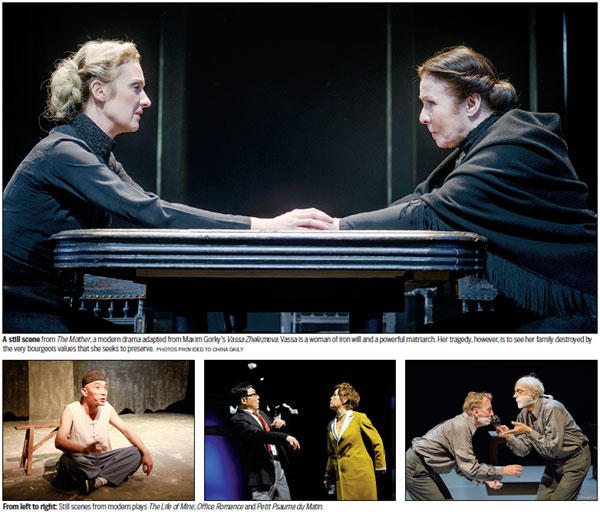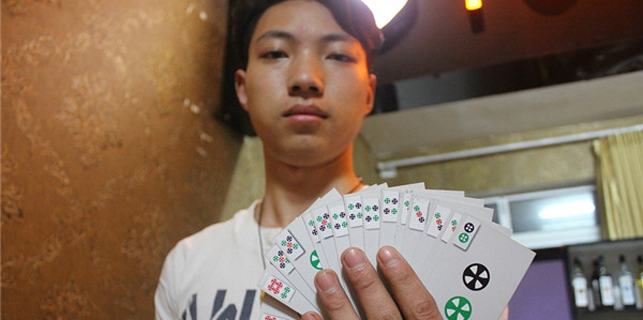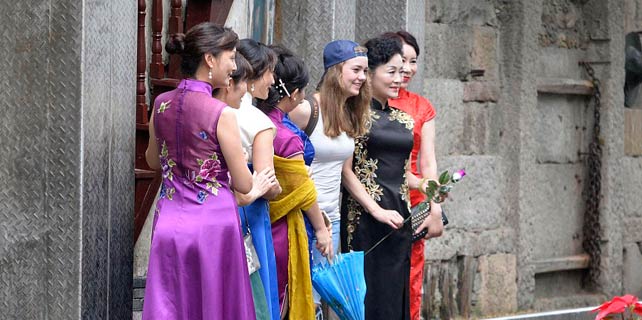Theater fever in Jing'an

From end April to late May, the city's upscale district will be set abuzz by various quality productions that showcase the talents of artists across three generations
Established in 2009, the Jing'an Modern Drama Valley is an annual festival featuring theatrical and street performances, lectures and speeches. This year, the event will present 18 productions in seven theaters across the district from May 5 to 22.
In a bid to boost audience engagement, the organizers this year reached out to members of the public, encouraging them to share stories set in the district. The most compelling of these stories could eventually be turned into a theater production at future editions of the festival.
This year also marks the 110th anniversary of huaju, which literally means "spoken drama" in China. Traditionally, Chinese theater was dominated by a wide variety of folk operas, featuring poetic lyrics and stylized performances.
However, a group of young artists presented a Chinese theater adaptation of Uncle Tom's Cabin in Shanghai in 1907, and this production has since been hailed as the beginning of huaju, or modern drama.
The performance art form soon gained popularity and spread to wider parts of the country. During the Japanese invasion of China (1931-1945), modern drama became an important tool for spreading political messages and revolutionary ideas.
An old school legend
During the April 12 news conference that announced the upcoming festival, Jiao Huang, a veteran actor whose career has spanned more than 60 years, reminisced about the rich theater traditions in Shanghai.
Theater brings warmth to a megacity such as Shanghai, said Jiao, who also praised Drama Valley for carrying on this cultural heritage and introducing fine theater productions from abroad. Jiao, who in 2013 won a special tribute award from the Drama Valley for his life-long dedication to the industry, added he is hopeful that Shanghai can one day "reclaim the summit of theatrical art in China".
The 81-year-old has throughout his illustrious career starred in hundreds of television shows, movies and theater productions, winning many national awards along the way and becoming one of the most respected artists in the nation's film and theater industries.
Born in Beijing in 1936, he moved to Shanghai when he was a teenager and was recommended to his school's theater group because he spoke better Mandarin than his peers.
He later decided to become an actor when he was in middle school.
During the time he studied at the Shanghai Theatre Academy, China's theater education was strongly influenced by the scene in Russia, and Jiao was under the tutelage of a Russian professor.
For his graduation project, Jiao played the leading role in Nikolai Gogol's The Government Inspector in Chinese. He spent two years rehearsing for the role.
However, just before the show was about to premiere in 1959, Sino-Russian ties came to a halt, resulting in the project being canceled. Fifty years later, Jiao decided to close that chapter in his life by gathering his ex-schoolmates to present the production in Shanghai.
Jiao said that he has not been acting in the past few years because of health problems. His most recent performance was in the TV series All Quiet in Peking four years ago.
While he has not acted in theater for many years, it is nevertheless still his greatest passion.
"The theater is the one and only space where I can experience the utmost joy of creativity. It is incomparable to film or TV acting. It is only on the theatrical stage that an actor can fully challenge himself and put his whole self to the test," he said.
"An actor builds his artistic vocabulary through theater. Acting for the TV or film screen is more about self-expression rather than creating a convincing character."
Jiao did not mince his words when he expressed his opinion about how many young Chinese actors today are merely inspired by the scenes of celebrity worship in Hollywood and seem more capable of acting in real life than on the screen.
He claimed that these young actors simply employ the same performance methods in different roles, and while they have nevertheless gained fame for their efforts, it does not take away the fact that their acting skills leave much to be desired.
Tian Qinxin, a Beijing-based female director, echoed this sentiment.
"While actors in other parts of Asia, such as Japan and South Korea, are able to present distinctive characters, China's actors present a hazy image. I hope our actors can have their own expression and voice, and bear China's cultural image with great confidence at major theater or film festivals," she said.
A champion for modern theater
As a child, Tian used to study martial arts and Peking Opera. During her studies in the United Kingdom, she worked as a teaching assistant on Chinese theater and literature.
The award-winning artist has been active in China's theater scene since 1996, having directed Kunqu, Peking Opera, as well as the recent musical production A Moment of Remembrance.
Tian will be directing Hurricane, an original Chinese play that is the opening production of the Drama Valley festival.
The play was also written by her. This will be the first time that she is directing a theater production in Shanghai.
Hurricane, which was originally written 16 years ago, is a joint production of the Drama Valley festival and the Shanghai Theatre Academy.
It will be shown at STA Theater from May 5 to 8. As the production is also the graduation project of the acting department of the school, all the roles will be played by students.
The play is based on the life story of Tian Han (1898-1968), a playwright, novelist and poet widely remembered as the person who wrote the lyrics to China's national anthem.
The female director said she was moved by the late playwright's personality and passion when she was a student at the Central Academy of Drama and was in turn inspired to tell his story. She described the man as a revolutionary artist and a free spirited "big brother" and "romantic lover".
Tian said that the other reason she decided to write and direct Hurricane was to make classics more comprehensible to modern audiences.
"I have always loved the stories of China but some classical stories might not have been as engaging because the language was too difficult for audiences to grasp. They need to be translated so more people can easily understand them," she said.
"My vocabulary is less rough and more refined than today's Web language. It is also more 'down-to-earth' than classical literature."
This new production will feature modern stage design and cutting-edge new media presentation.
Between six and eight cameras will be used to capture imagery that will be combined with graphic designs before being projected on the stage.
Tian pointed out that as a theater director, she considers it her mission to make use of the technology and methods she is adept in to present Chinese stories.
Tian revealed that she is also particularly interested in theater engineering. She once created specific acoustic effects in addition to geometrical designs in new media presentation so as to illustrate the conflicts and confusion in the mind of a character suffering from Alzheimer's.
"If we want to participate in international exchange, we need to tell our own stories with modern technology and methods," she said.
"I am working with China's strongest team in visual presentation for theater. They have provided great support for my theatrical explorations in the past and I hope we can reach new heights with Hurricane in Shanghai."
A star in next-gen theater
Although Meng Jinghui Theater Studio's new production, titled 9 and 1/2 Love, is not part of the Drama Valley festival, this one-person play is nonetheless notable because it features rising young star Huang Xiangli.
The show will be held at Yihai Theater in Jing'an district from April 26 to May 7.
Meng Jinghui, the director and playwright, has called Huang his "muse" and the sole reason he writes one-person shows.
"She has redefined one-person shows. When there is only one person in a theater production, it is one against all audiences," said Meng.
"The actress will be shifting between 10 different characters during the show, and she will be using all her training and skills to perform, tell the story and communicate with the audience."
During her nine years working with Meng and his studio, Huang has performed in 2,300 shows.
In the past few years, she has starred in two one-person productions: Letter from an Unknown Woman, which was adapted from the story by Stefan Zweig, and Bonjour Tristesse, adapted from a novel by French author Francoise Sagan.
Standing on the stage by oneself, an actor needs to know when to communicate with the audience, and when to ignore them, Meng said.
"It is important that the actor is able to enter a poetic space at particular moments, stand in utter loneliness in front of the audience. It takes great confidence to achieve that," he added.
zhangkun@chinadaily.com.cn
















